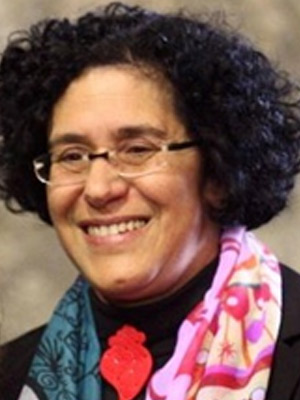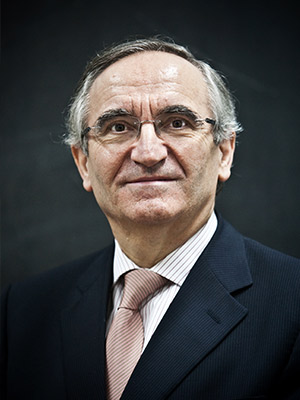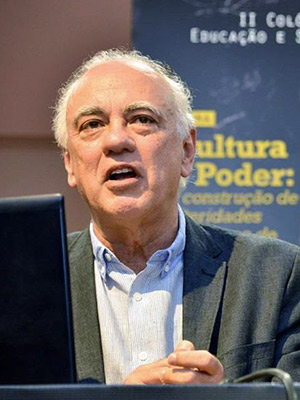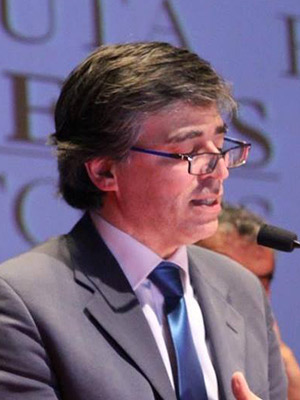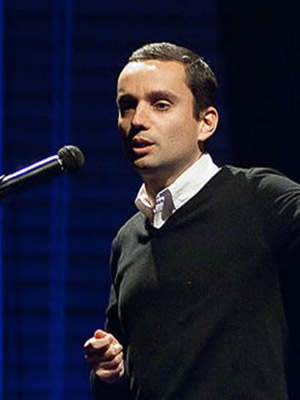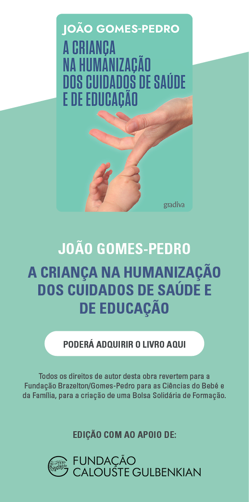Formação

Conferência Internacional “Addressing and Supporting Family and Child Wellbeing | 15 years of Touchpoints in Portugal”
Dias 9 e 10 de Novembro de 2017
November 9 – 10, 2017
Faculdade de Medicina Dentária da UL | Auditório Prof. Armando Simões dos Santos | Cidade Universitária
Tradução simultânea
Simultaneous translation
Nesta Conferência colocaremos em evidência eixos de reflexão e ação fundamentais para o bem-estar das crianças e suas famílias, com base no Modelo Touchpoints, cuja implementação em Portugal comemora 15 anos em 2017. O Modelo Touchpoints constitui-se como uma teoria dinâmica do desenvolvimento, com implicações na mudança de práticas em saúde pediátrica, educação, intervenção precoce e serviços sociais. Trata-se de uma abordagem no trabalho com crianças e famílias, de desenvolvimento profissional, organizacional, e de fortalecimento da comunidade.
O Bem-estar, como estado dinâmico relacionado com a realização social e pessoal, apela a uma compreensão multidimensional e sistémica, que incorpora diferentes perspetivas – objetivas e subjetivas. As perspetivas objetivas incluem aspetos como os rendimentos familiares, os recursos educacionais, o estado de saúde; as subjetivas incluem indicadores relacionados com a perceção de felicidade, qualidade de vida e satisfação com o modo de vida.
Neste âmbito, há uma necessidade premente de recolhermos mais dados sobre o desenvolvimento e bem-estar dos bebés e das crianças nos primeiros anos de vida (UNICEF, 2013). Os avanços em neurociência e nas ciências sociais têm confirmado, repetidamente, que é nesta fase do desenvolvimento que o potencial genético interage de forma infinitamente complexa com as experiências precoces, construindo os caminhos neurais e conexões que são os fundamentos e os andaimes para todo o desenvolvimento posterior. É, portanto, nestes Touchpoints/períodos sensíveis de vida que bem-estar, saúde e desenvolvimento da criança mais necessitam dos cuidados e proteção. Torna-se cada vez mais claro que o investimento nestes anos pode ter efeitos muito substanciais e sustentados no bem-estar das crianças de hoje, nas suas vidas futuras, e a longo prazo, no bem-estar das comunidades e sociedades como um todo.
A conferência organiza-se, assim, com base em três eixos fundamentais:
- Prevenção do Bem-estar de crianças e suas famílias;
- Promoção da qualidade de vida de crianças e suas famílias;
- Construção partilhada de uma cultura da criança.
Estes eixos, por sua vez, desdobram-se em áreas temáticas-chave no âmbito das Ciências do Bebé e da Família, que irão acolher as propostas para comunicações orais e posters:
- Modelo Touchpoints | NBAS e NBO
- Políticas e Direitos do bebé, da criança e da família
- Bem-estar e saúde do bebé, da criança e da família
- Educação de Infância e formação de profissionais
- Inclusão e Intervenção Precoce na Infância
- Desenvolvimento profissional, organizacional e comunitário
- Vulnerabilidade e risco – prevenção e intervenção
Contamos com o contributo partilhado, fundamentado, reflexivo e crítico de todos para melhor conquistarmos o bem-estar de bebés, crianças e suas famílias, assegurando que:
-
1. Os profissionais/cuidadores têm formação de elevada qualidade para trabalhar com crianças e suas famílias,
2. O contexto que envolve as famílias potencia uma boa parentalidade,
3. As comunidades mobilizam-se para fomentar recursos e serviços para a Infância,
4. A parentalidade está a ser bem apoiada,
5. Verificam-se resultados positivos na relação entre pais/cuidadores e crianças e entre famílias e profissionais,
6. O desenvolvimento das crianças é valorizado, assegurado e potenciado.
Destinatários
Profissionais nos domínios da Saúde, Educação, Intervenção Precoce na Infância, Justiça, Ambiente, Psicologia, Sociologia, Antropologia, Direito e outros relacionados com as Ciências do Bebé e da Família.About the Conference
In this Conference, we will highlight key areas of reflection and action that are fundamental to the wellbeing of children and their families, based on the Touchpoints Model, whose implementation in Portugal celebrates 15 years in 2017. The Touchpoints Model is a dynamic theory of development, with implications on the transformation of practices in pediatric health, early childhood education, early intervention and social services. It is an approach in our work with children and families, in professional development, in the organizational domain, and on community strength.The definition of wellbeing, as a dynamic state related to social and personal fulfillment, calls for a multidimensional and systemic understanding that includes different perspectives - objective and subjective. Objective perspectives include aspects such as family income, educational resources, health status; subjective perspectives include indicators related to the perception of happiness, quality of life and satisfaction with the way life is perceived.
In this context, there is an urgent need to collect more data on the development and wellbeing of infants and children in the earlier years of life (UNICEF, 2013). Advances in neuro and social sciences have constantly confirmed that it is during this period of development that the genetic potential interacts in an infinitely complex way with early experiences, building neural pathways and connections that are the bases and scaffolds of all future development. Therefore, it is in these Touchpoints/sensitive periods of life that wellbeing, health, and child’s development most need care and protection. It is becoming increasingly clear that investment in these years can have a very substantial and sustained effect on the wellbeing of children at present, on their future lives, and, in a long-term, on the wellbeing of communities and societies as a whole.
Thus, the conference structure is based on three fundamental pillars:
- Prevention of the wellbeing of children and their families;
- Promotion of the quality of life of children and their families;
- Shared construction of a child's culture.
These pillars are divided in key areas within the scope of the Baby and Family Sciences, which will be the topics of the oral and poster communications:
- Touchpoints Model | NBAS and NBO;
- Policies and Rights of the baby, the child and the family;
- Wellbeing and health of the baby, the child and the family;
- Childhood education and training of professionals;
- Inclusion and Early Intervention in Childhood;
- Professional, organizational and community development; - Vulnerability and risk - prevention and intervention.
We are counting on the shared, informed, reflexive and critical contribution of all to a better achievement of the wellbeing of infants, children and their families, ensuring that: :
-
1. Caregivers / professionals have high quality training to work with children and their families;
2. The context involving families encourages good parenting;
3. Communities are modilized to promote resources and services for children;
3. Parenting is being well supported;
4. There are positive results in the relationship between parents/caregivers and children, and between families and professionals;
5. The development of each child is valued, secured, and empowered.
Comissão Científica | Scientific Committee
Ana Teresa BritoEmílio Salgueiro
Daniel Sampaio
Isabel Soares
João Gomes-Pedro (Presidente)
João Justo
Maria Raul Lobo Xavier
Marina Fuertes
Nair Azevedo
Pedro Ferro Menezes
Rita Silveira Machado
Teresa Goldschmidt
Comissão Organizadora | Organizing Committee
Presidente | João Gomes-PedroAna Teresa Brito
Nair Azevedo
Direcção de Comunicação | Communication Direction
Maria João RochaSecretariado | Secretariat
Alexandra FernandesOrientações para a apresentação de resumos | Guidelines for abstract preparation
Tipo de apresentação | Type of presentation
Apresentação oral - 15 minutosOral presentation - 15 minutes
Apresentação de Posters Medidas do Poster A1 (594mm x 841mm)
Poster presentation | Poster size is A1 (594mm x 841mm) portrait
Serão aceites apresentações orais e apresentações de posters, no âmbito dos seguintes temas:
Oral presentations and poster presentations will be accepted under the following themes:
- Modelo Touchpoints | NBAS e NBO
Touchpoints Model | NBAS e NBO - Políticas e direitos do bebé, da criança e da família
Policies and baby, child, and family rights - Saúde e bem-estar do bebé, da criança e da família
Baby, child, and family well-being and health - Educação de infância e Formação de profissionais
Early childhood education and teachers training - Inclusão e intervenção precoce na infância
Inclusion and early childhood intervention - Desenvolvimento profissional, organizacional e comunitário
Professional, organizational and community development - Vulnerabilidade e risco – prevenção e intervenção
Vulnerability and risk – prevention and intervention
Serão considerados estudos e projetos de intervenção originais, no domínio das Ciências do Bebé e da Família. Um autor não pode submeter mais de dois abstracts. Deverá ser primeiro autor somente numa das propostas.
Original studies or intervention projects, from the field of Baby and Family Sciences, will be considered for oral presentations and posters. One author can submit no more than two abstracts, being the first author in only one of them.
Orientações gerais | General guidelines:
-
O título deve ser curto e informativo. Evitar abreviaturas e subtítulos.
The title should be short and informative. Abbreviations and subtitles should be avoided. -
O resumo deve ter entre 200 a 300 palavras (sem incluir título, nome dos autores, afiliação institucional e palavras-chave).
Abstracts should have between 200 and 300 words (not including the title, authors’ names, institutional affiliation, and key words). -
O resumo que apresente resultados de investigação deve incluir: tema da pesquisa, metodologia, resultados e conclusão.
Abstracts presenting research results should include: research subject, methodology, results, and conclusion. -
O resumo não devem incluir referências bibliográficas.
Abstracts should not include references. -
Devem ser definidas três a cinco palavras chave.
Three to five key words should be provided. -
Os autores devem anexar o resumo sem qualquer identificação no campo devidamente criado para o efeito em: Submissões
Authors should attach their abstracts without any identification in the field: Submissions.
Orientações para a preparação técnica do resumo | Guidelines for technical preparation of abstract:
O resumo deve ser escrito em Inglês e em Português, ou somente em inglês, em Microsoft Word, fonte Times New Roman tamanho do tipo de letras 12. O texto deve ser justificado, em tamanho A4, com margens de 2cm.Abstracts should be written in English and Portuguese, or only in English, in Microsoft Word, Times New Roman font type. The text should be fully justified, on A4 paper size, with margins set at 2cm.
Submissão de Apresentações Orais | Posters | Submissões Fechadas!
Poster | Oral Apresentation | Submission
Os resumos deverão ser submetidos até dia 9 de Agosto
The abstracts should be submitted until August 9
Por favor siga as orientações aqui
Please follow the instructions here
Datas importantes | Key DATES
8 de Maio, 2017 | May, 8, 2017Abertura das inscrições | Call for registration open
9 de Julho, 2017 | July, 9, 2017
Data limite para submissão online de resumos (1ª fase) | Abstract/proceedings first submission deadline
25 de Julho, 2017 | July, 25, 2017
Notificação aos autores da 1ª fase de submissão | Notification to authors first submission
9 de Agosto, 2017 | August, 9, 2017
Nova data limite para submissão online de resumos (2ª fase) | New Abstract/proceedings second submission deadline
4 de Setembro, 2017 | September 4, 2017
Notificação aos autores da 2ª fase de submissão | Notification to authors second submission
10 de Setembro, 2017 | September 10, 2017
Data limite para inscrição dos apresentadores/autores de ambas as fases | Registration closed for presenters both submissions
Data limite para inscrição antecipada | Registration for earlybirds
Faça aqui o download do programa
Download here
Este programa poderá sofrer ligeiras alterações.
Please note that minor changes to the program are still possible.
Conferência Internacional “Addressing and Supporting Family and Child Wellbeing | 15 years of Touchpoints in Portugal”
dias 9 e 10 de Novembro de 2017November 9 – 10, 2017
Faculdade de Medicina Dentária da UL | Auditório Prof. Armando Simões dos Santos | Cidade Universitária
Tradução simultânea
Simultaneous translation
Preenchimento do Formulário de Inscrição (Online)
140€ (cento e quarenta euros)
Registration (Online)
140€ (one hundred and forty euros)
Condições especiais:
Estudantes (é necessário enviar comprovativo) e antigos formandos dos cursos realizados pela FBGP desde 2010:
100€ (cem euros)
Special conditions:
Students (it is mandatory to send proof) and former graduates from the training courses held by FBGP since 2010: 100€ (one hundred euros)
Participantes de uma mesma instituição têm condições especiais para inscrições em grupo: três (3) ou mais participantes
120€ (cento e vinte euros)
Participants from the same institution have special conditions for group registration: three (3) or more participants
120€ (one hundred and twenty euros)
Dados para transferência | Bank transfer information:
IBAN: PT50 0007 0000 0083 3292 2752 3
A sua inscrição na Conferência só será considerada válida após o pagamento da mesma. Agradecemos que, ao submeter a inscrição, anexe o comprovativo de transferência bancária (incluir no campo "anexar comprovativo de pagamento da Conferência").
Confirmaremos, em seguida, a boa receção do comprovativo de transferência.
Registration will only be valid after payment. When submitting the application, please attach the bank transfer proof (in the registration form "attach proof of payment").
After receiving the bank transfer proof, registration will be confirmed.
Inscrições limitadas ao número de lugares existentes.
Registrations are limited to the number of available seats.
Para qualquer informação | For more information:
inscricoesconferencia2017@fundacaobgp.com
Desistências:
Em caso de desistência, só será devolvido o valor da inscrição até 20 de Outubro.
Withdrawal:
In case of cancellation, the registration fee will only be refunded until October 20.
Inscrições | Registration
Como Chegar | Directions
- CARRIS | BY BUS - CARRIS | 731, 732, 735, 738, 768
- TST | BY BUS - TST | Almada/Cidade Universitária
- COMBOIO (Fertagus ou CP) | BY TRAIN - Fertagus or CP | Entrecampos
- METRO | UNDERGROUND | Cidade Universitária

Ao grupo de voluntárias (ordem alfabética)
Ana Filipa Martins | Ana Lourenço | Carolina Costa | Daniela Borges | Diana Simões | Joana Gaspar | Joana Gomes-Pedro | Joana Santos | Laura Jorge | Leonor Rocha Leite | Mafalda Líbano Monteiro | Manuela Loureiro | Mara Sousa | Maria João Alves | Marta Brazão | Natércia Santos | Sara Ticló | Sheila Diogo


